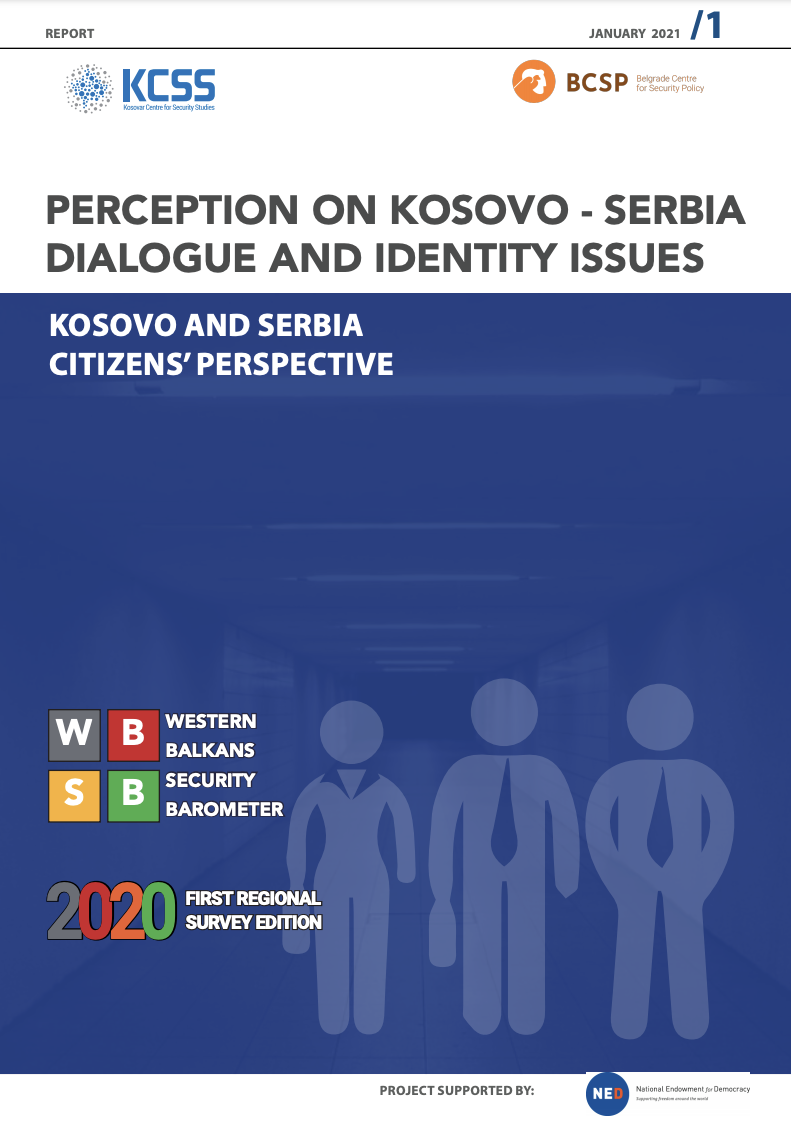1/02/2021

Kosovar Centre for Security Studies and Belgrade Center for Security Policy
National Endowment for Democracy
Plator Avdiu, Ramadan Ilazi, Bojan Elek
After almost a decade of the process and in some cases negative coverage by the media, the citizens of both Serbia and Kosovo seem to be relatively strong in their support of the dialogue. The percentage in support for the dialogue is slightly different in Kosovo and Serbia. Kosovar citizens seem to have a stronger support with 68% compared to the Serbian citizens with 51%. This, rather high percentage of the support for the dialogue in both countries challenges the common assumption that the dialogue is not popular. This would seem to suggest that the citizens see a value and a benefit in the dialogue process. However, this assumption is undermined, with the very high percentage of the citizens in Kosovo (80%) and Serbia (90%) who do not see any personal benefit from the dialogue. This result, can imply that citizens see the dialogue as a responsibility of the elites, or a process happening at the macro level, not touching their lives. Perhaps, the high percentage of the citizens in both countries, that do not perceive the dialogue to have personal benefits to them is a manifestation of a lack of effective communication from the EU and more importantly the governments in Kosovo and Serbia, about the benefits the dialogue.
The negative perceptions of citizens towards the benefits of the dialogue, seem to be connected with the citizen perceptions of the transparency of the process. In Serbia, only 17% have said that they are familiar with the content of the dialogue and considered it transparent, where as in Kosovo this figure is even lower at 11%. In this sense, a common denominator for both societies emerges, as citizens in both countries seem to agree that the dialogue lacks transparency. In Serbia 82% of the citizens said that the dialogue is partly or not at all transparent, while in Kosovo 77% said the dialogue is not transparent or completely lacks transparency. Transparency or the extent of it is an inherent challenge with the processes of facilitations/mediation of disputes between parties. Facilitators are faced with the difficult dilemma of when, what and how much to reveal to the public, in order to not spoil or create backlash on potential compromise solutions.
KEY FINDINGS:
• Majority of citizens of Kosovo and Serbia support the dialogue process; however, they have diametrically opposed perception of the goals of the dialogue. While most Kosovo citizens believe the goal of the dialogue is mutual recognition, in Serbia the goal is perceived to be return of Kosovo to Serbia with wider autonomy;
• Citizens of Kosovo and of Serbia largely share their negative perceptions of the dialogue process, with respect to transparency and its impact. Most citizens of Kosovo and Serbia think that the dialogue lacked transparency and it did not change anything or that they had any personal benefits from the process. This suggests significant shortcoming in communication approaches of the EU and governments of Kosovo and Serbia;
• Citizens of Serbia are less optimistic compared to Kosovo citizens about the future of therelations between the two countries. Majority of the Serbs do not expect to see normalization of relations with Kosovo Albanians regardless of the outcome of the dialogue;
• The citizens’ perception of the Kosovo-Serbia dialogue seems to suggest that they do not view the process to mean normalization between the two societies of the countries, but it is rather seen as normalization between state authorities. Agreements and achievements in the dialogue that are reached in Brussels do not see to be translated in the same way in the society as a whole. In other words, a final agreement between Kosovo and Serbia that would be seen to constitute achievement of normalization, would not signify the same for the citizens in both countries. Therefore, normalization of the relations process should not supplant the clear necessity that these result show for a process of reconciliation and healing between peoples of Serbia and Kosovo.
This report is published in the framework of the regional project "Western Balkans Security Barometer" supported by the National Endowment for Democracy (NED). The views presented in this report are perceptions of the respondents and do not necessarily represent the views of Kosovar Centre for Security Studies and Belgrade Centre for Security Policy. Opinions expressed in this report do not necessarily represent the views of the National Endowment for Democracy (NED).